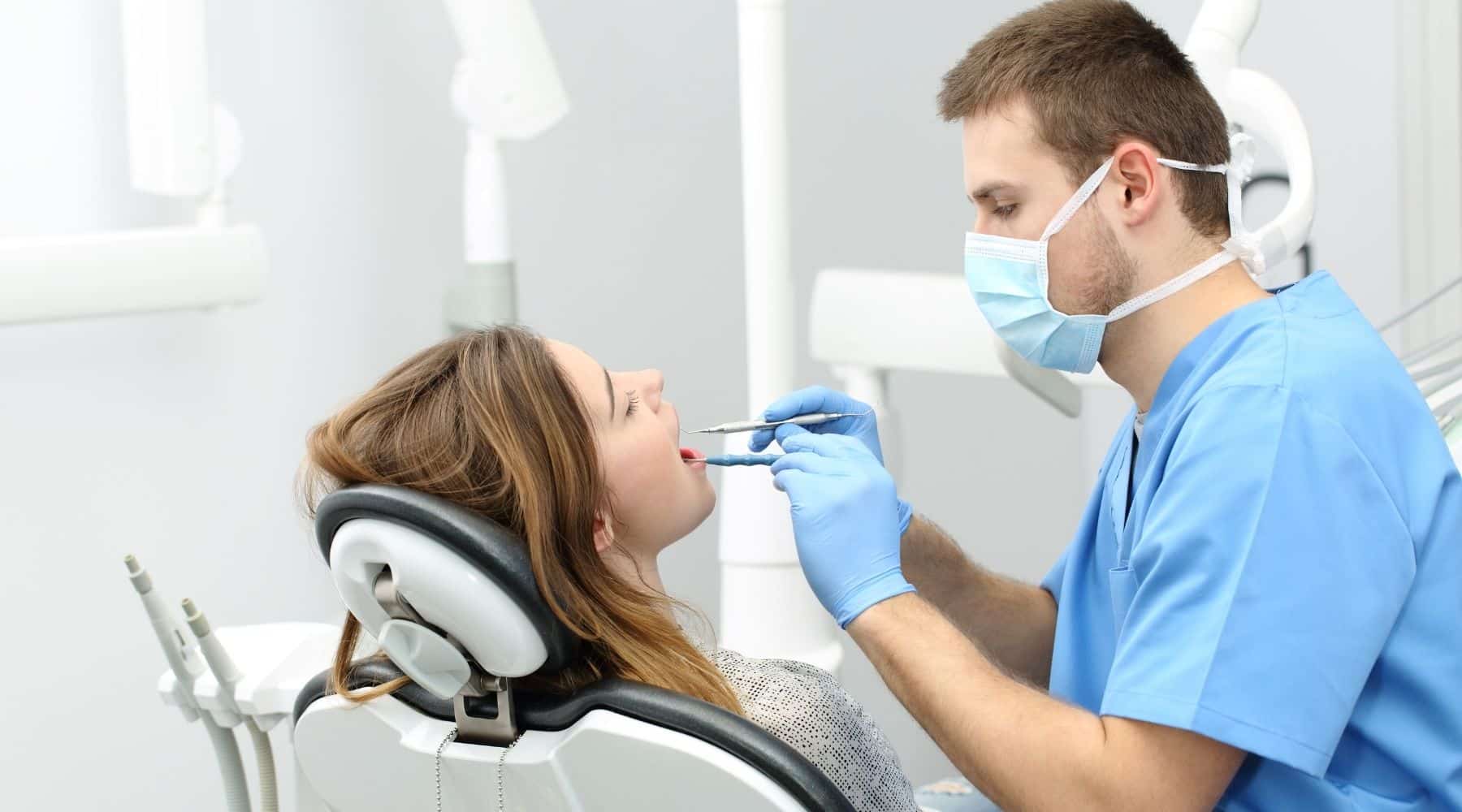In Australia, most dental treatment is provided through private dental clinics. Because Medicare generally doesn’t cover dental care, many people use private health insurance to help manage the costs.
Dental cover is usually available as part of extras policies. It can include routine and preventative care as well as more complex treatments, reducing what you pay out of pocket when you need to see a dentist.
What does private dental insurance cover?
Private dental insurance generally covers three types of treatment: general dental, major dental and orthodontics.
General dental covers routine and preventative care, such as check-ups, cleans and basic treatments and is included on even the most basic extras policies. Some policies split this into preventative and general dental, with separate limits or shared limits across both.
Major dental covers more complex and expensive procedures, like crowns, bridges and root canals. It’s available on higher-level extras policies, though may come with more restrictive annual limits and sublimits.
Orthodontic cover helps pay for treatments that correct misaligned teeth, jaw issues and bite problems, such as braces or aligners. This is typically only available on more expensive plans and comes with longer waiting periods and strict claim limits.
Here’s what each type typically includes:
| General dental (including preventative dental) | Major dental | Orthodontics |
|---|---|---|
| Dental examinations | Major fillings (inlays and onlays) | Braces |
| Scale and clean | Crowns | Plates |
| Plaque removal | Bridges | Retainers |
| Polishing | Dentures | |
| Fluoride treatments | Implants | |
| Fissure sealing | Root canals (endodontics) | |
| Routine extractions | Surgical extractions | |
| Basic fillings | Gum disease treatment (periodontics) | |
| Dental X-rays | Sleep apnoea appliances |
What isn’t covered by dental insurance?
Some dental treatments aren’t covered by private health insurance, such as:
- Cosmetic procedures like teeth whitening and veneers for aesthetic purposes
- Dental treatment received outside Australia
- Dental work performed in a hospital setting, such as tooth extractions under general anaesthetic (this will require hospital cover)
- Treatment received before you’ve served the relevant waiting period, including for pre-existing conditions
- Claims above your annual limits – once these are reached, you’ll need to pay any further costs out of pocket
Other treatments may only be covered in limited circumstances. For example, dental implants may be covered by health insurance under some major dental policies, but usually come with strict annual caps and lower benefit limits.
What are the waiting periods for dental insurance?
A waiting period is the time you must wait after joining a policy before you can claim benefits for certain treatments. These are the standard waiting periods:
General dental: 2 months
Preventative dental: 2 months
Major dental: 12 months
Orthodontics: 12 months
How much does dental insurance cost?
Dental insurance can range from low-cost extras policies that include basic general dental, through to more expensive plans with higher limits that include major dental and orthodontic cover. Even with the same insurer, extras cover can vary significantly.
Let’s look at some of the cheapest and most expensive extras plans on offer from health insurers we work with:
| Provider | Cheapest plan (monthly) | Most expensive plan (monthly) |
|---|---|---|
| HCF | $18 | $89 |
| nib | $26 | $135 |
| Bupa | $26 | $71 |
| ahm | $33 | $97 |
| Australian Unity | $43 | $96 |
| Source: Compare Club, January 2026 Figures are based on a single 35-year-old living in Sydney. These are extras-only plans and do not include hospital cover. Compare Club may not offer all plans available from each provider. |
||
However, it’s important to look beyond the premium. While cheaper policies may be appealing, they usually come with lower benefit limits and more restrictions. This means the amount you can claim back for dental treatments is often less, and you might end up paying more out of pocket despite the lower premium.
Are there limits on how much I can claim for dental insurance?
Dental cover doesn’t usually pay the full cost of treatment. Benefits are typically paid as either:
- A percentage of the dentist’s fee, or
- A set dollar amount per service
If the benefit doesn’t cover the full cost, you’ll need to pay the rest out of pocket.
Some treatments, like orthodontics, have lifetime limits, meaning you can only claim up to a certain amount over the lifetime of the policy.
Many health insurers have networks of private dental clinics where extras members can get treatment with higher benefit rates, meaning you may pay a reduced amount or even no fees for your care at these clinics.
Case study: The cost of dental treatment with and without insurance
Ed has held a private health insurance extras policy with general and major dental cover for two years, paying $50 a month ($600 per year) for his policy.
He can claim up to $600 for general dentistry per year and $600 for major dentistry, with benefits paid at 60% per service. Check-ups are covered at 100% when he visits a dentist in his fund’s provider network.
Early in the year, Ed goes for a routine check-up and cleaning, which costs $250. During the appointment, his dentist discovers a cavity that needed a filling, costing $350.
A few months later, Ed accidentally breaks a different tooth and requires a crown, which costs $1,200.
The total cost of Ed’s dental treatment for the year comes to $1,800.
Without insurance, Ed would need to pay the full amount out of pocket. However, as he has insurance and has served all the waiting periods, he can claim for all three treatments on his extras plan.
With insurance, Ed can claim:
- 100% of the check-up through the provider dentist ($250)
- 60% of the filling through general dental ($210)
- 60% of the crown through major dental, up to a maximum of $600 due to the annual cap – meaning he receives $600
In total, Ed saves $1,060 and pays only $740 out of pocket for the dental treatment.
Even after factoring in the annual cost of his policy ($600), Ed’s total cost for the year is $1,340, which is still less than the $1,800 he would have paid without insurance. On top of that, his extras cover also provides benefits for other services throughout the year, helping improve the overall value of the policy.
Tips for choosing the best dental health insurance plan
-
Look at claim limits
Check the maximum amount your insurer will pay for each treatment, whether it’s a fixed dollar amount or a percentage of the cost, and make sure it offers adequate cover for treatments you might need.
-
Know the cover limits
Look closely at total annual limits and any caps on specific treatments. If you’re on a family plan, compare the overall policy limit with per-person limits as often the total cap means less benefit per person.
-
Consider provider networks
Some health funds have arrangements with private dental clinics that offer “no gap” treatments, meaning lower or no out-of-pocket cost for you.
-
Check waiting periods
Waiting periods can delay when you can start claiming for certain treatments. However, some providers may waive dental waiting periods so you can get help sooner.
-
Think about your needs
Don’t pay for extras you’re unlikely to use. Pick a plan that focuses on the treatments you need most to get the best value for your money.
Why compare health insurance policies through Savvy?
100% free service
There's no need for you to pay a cent to compare a variety of competitive policies side-by-side in one place.
Compare policies online
You can consider the inclusions, premiums, benefits and other key factors easily online, whether you're at home or on the go.
Trusted partners
We're partnered with Compare Club to help our customers lock in the best deal tailored to their needs.





